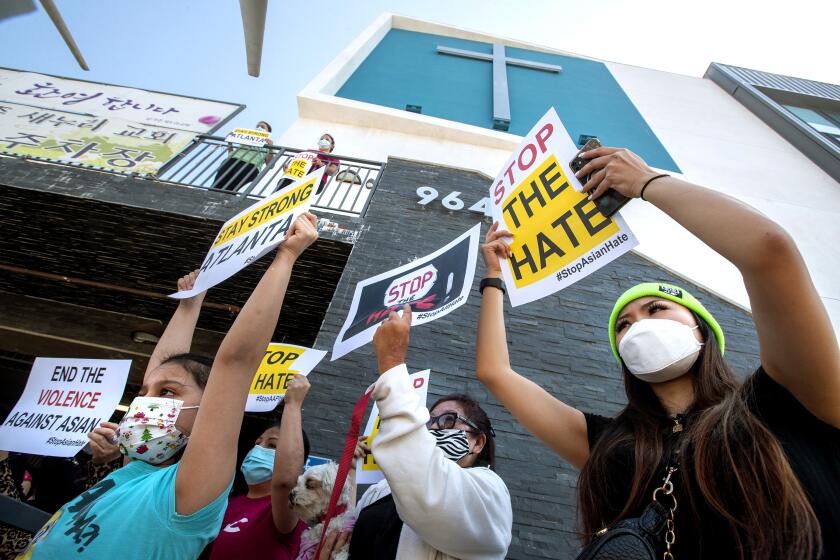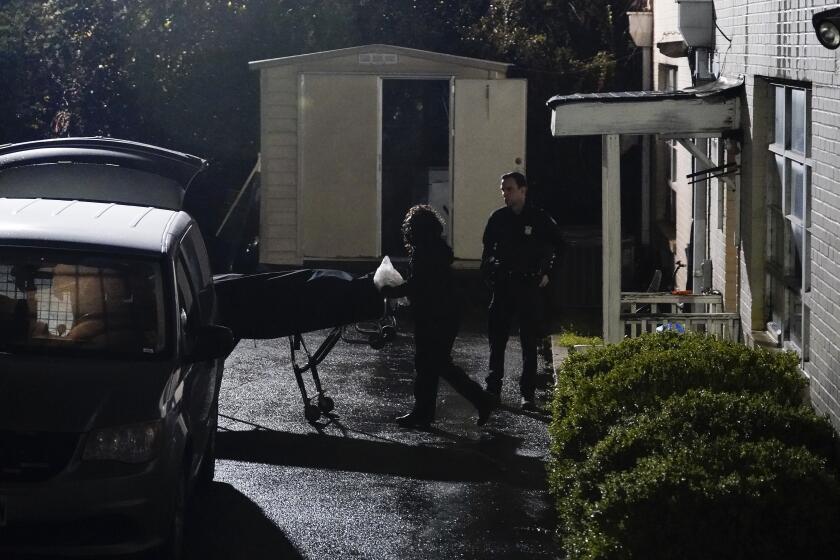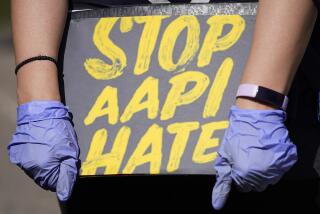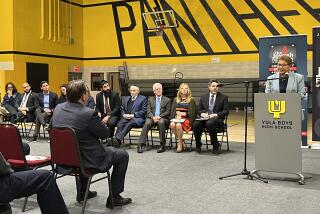Rallies against anti-Asian attacks and racism across California
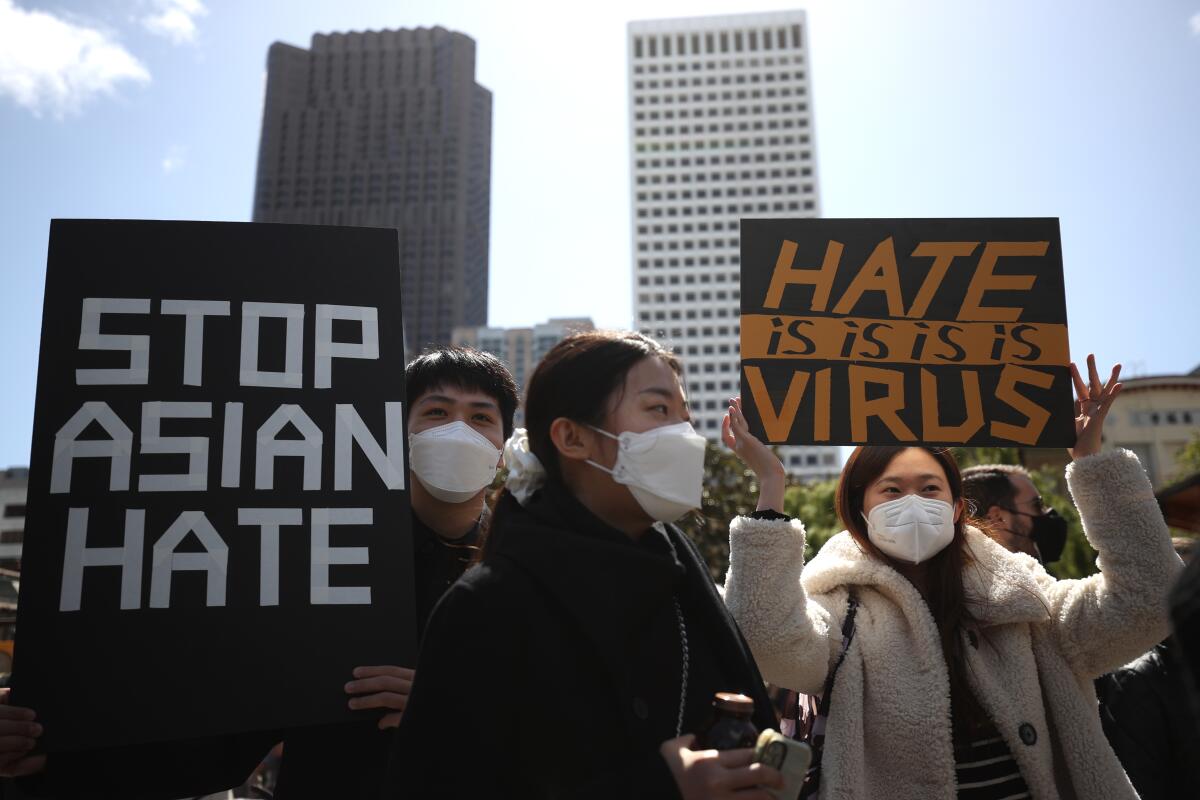
SAN FRANCISCO — Asian Americans and their supporters gathered Saturday across California and the nation in response to this week’s shooting rampage in the Atlanta area, which claimed eight lives, including six women of Asian descent.
A demonstration was held Saturday night in Alhambra. Hundreds of people gathered at a “Stop Asian Hate” vigil at Almansor Park to honor the shooting victims.
“We will not be silent against the gun violence,” Betty Hang, organizer of the vigil, wrote on Facebook. “We want to remember the importance of uniting — for love, understanding and compassion of our community.”
A rally San Francisco event was large, colorful, almost festive — but marked by testimonials of anguish and recollections of racist encounters. It came as the nation has seen a surge in hate crimes against Asian Americans since the pandemic began. The coronavirus was first identified in Wuhan, China.
Those gathered Saturday held signs with such messages as “We are NOT a Virus,” “We are Humans” and “Stop the Violence.” Some sang songs to console each other, while others gathered on the square painted butterflies and assembled kites, symbols of peace. Speakers addressed the crowd in English and Cantonese, calling for unity, solidarity and respect for the victims.
“How many more of our people’s blood, black eyes, swollen faces, broken bones, must happen before we will be visible?” said 13-year-old Ashlyn So. “Before we will feel safe? Before we will be an equal?”
The teenager said later that she felt a “surge of energy” to speak out about anti-Asian racism after speaking with the daughter of San Francisco resident Vicha Ratanapakdee, an 84-year-old Thai American who died after an assailant violently shoved him to the ground in January.
In the wake of this week’s shootings at three Atlanta-area spas, advocates hope the national focus on hate crimes and incidents toward Asian Americans will empower more people to report their experiences.
In Georgia, Robert Aaron Long, 21, who is white, is charged with murder in the killings of eight people on Tuesday at Gold Spa and Aromatherapy Spa in Atlanta and Young’s Asian Massage, 25 miles away. The vigils Saturday included one in Atlanta outside the state Capitol. Among the speakers were the state’s recently elected Democratic senators, Jon Ossoff and Raphael Warnock.
Long told authorities he was not targeting Asians, but in San Francisco on Saturday, participants of Asian descent said they could not avoid seeing themselves in the victims.
After seeing the faces of the victims who looked like her, said Crystal Liang, she wondered if she might be next.
“I don’t know what I would do if something like that happens to me, but that’s why I decided to come out here today as an Asian woman and voice my anger,” said Liang, an instructor at a San Francisco day-care center and a recent immigrant from Guangdong, China.
Before the pandemic, she had never attended protests or political events, but that’s changed in recent months. The need to be more vocal about racism against Asian Americans has been a long time coming, she said.
“I’m furious…. Even before COVID-19, when we went out on walks or when we were on the bus, people would scream at us to “go back to China,” Liang said.
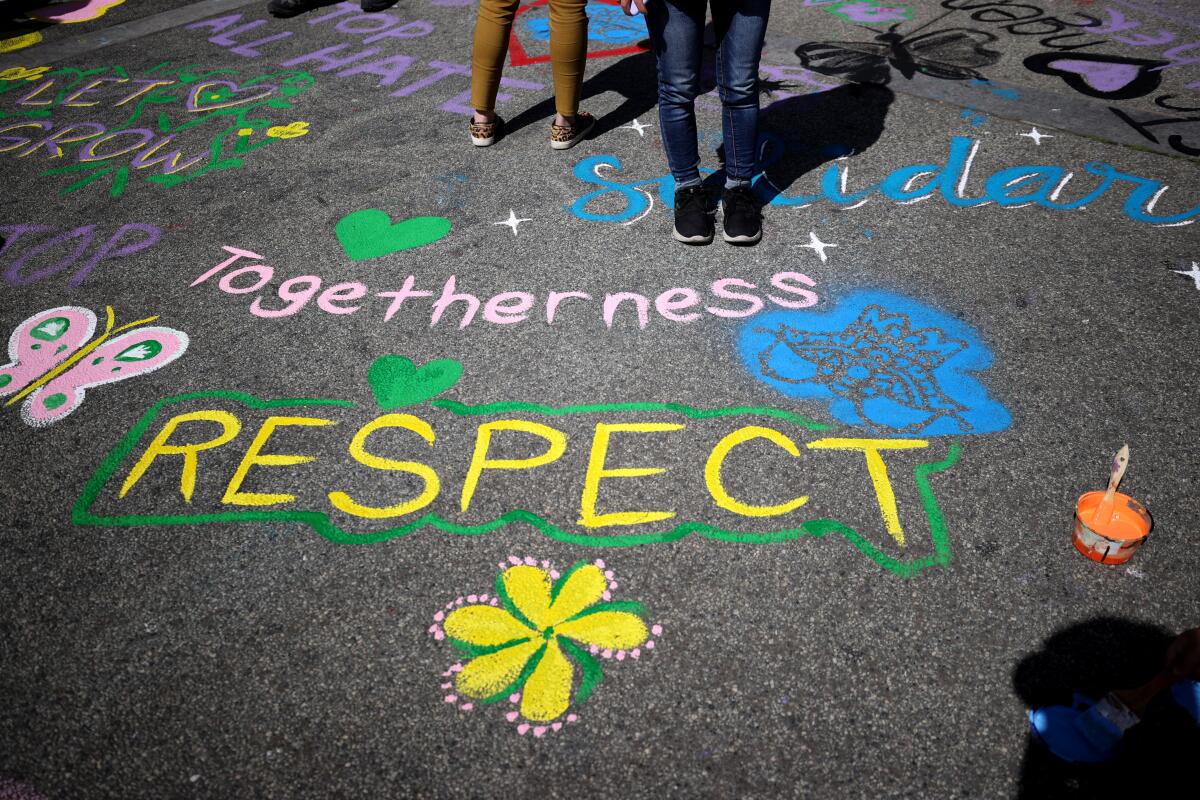
Since coronavirus shutdowns began last March, thousands of Asian Americans have faced racist verbal and physical attacks or have been shunned by others, according to a report released Tuesday.
The report by Stop AAPI Hate documents 3,795 racially motivated attacks against Asian Americans from March to February, noting that the number is probably a significant undercount of the incidents that occurred, because many were not reported to the group.
Sasanna Yee connected such data to her family’s personal experience when she stepped onto a makeshift stage in San Francisco to recall her grandmother Yik Oi Huang. She said her grandmother died last year of complications from injuries sustained in a beating in January 2019.
Here’s what we know about the victims in the attacks on three Atlanta-area spas that left eight people dead, including six women of Asian descent.
“I come out and I show up time and again to be with our community because it’s healing, because I know I cannot carry this pain by myself,” said Yee, a yoga teacher and organizer of the Bay Area organization Asians Belong. “I am hurting. I’ve had nightmares: people breaking into my house and holding a gun against me.”
Participants spoke of the need for community-based foot patrols or mental health hotlines for victims of race-based attacks. The state Legislature will be considering bills that would set up a hotline to report hate incidents and that would expand care for victims, said Assemblyman David Chiu, who is involved in those efforts.
He added that he was not surprised by the size of the crowd or its passion.
“It’s been an intense moment for every Asian American in this country,” Chiu added. “I think that a lot of this was set in motion by giving permission to too many Americans to blame Chinese and Asian Americans for the ills of society today.”
At the Alhambra rally, people said they were disgusted by the hate targeted not just at Asians but also other groups.
“I’m heartbroken to see elderly people not only attacked in my community but attacks in Hispanic vendors as well,” attendee Norma Federico told KCBS-TV Channel 2. ” This needs to stop.”
There were also events in Fullerton, Oakland and other parts of the Bay Area.
“I’m exhausted, and quite frankly, I didn’t want be here today,” Garden Grove Mayor Pro Tem Kim Nguyen said at the Fullerton rally.
“It is not our job and should not be our job to educate you, but here we are, enraged, scared, exhausted and traumatized, telling you why our stories matter, and begging you to stop aiding in the erasure of our Americanness and to please stop making excuses for white violence,” Nguyen said, according to the Orange County Register.
Lin reported from San Francisco and Blume from Los Angeles.
More to Read
Sign up for Essential California
The most important California stories and recommendations in your inbox every morning.
You may occasionally receive promotional content from the Los Angeles Times.
